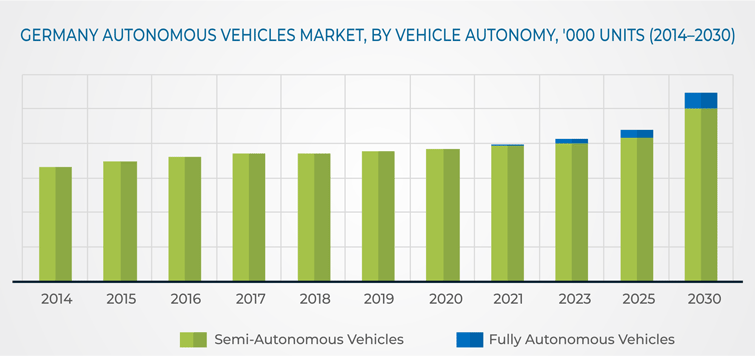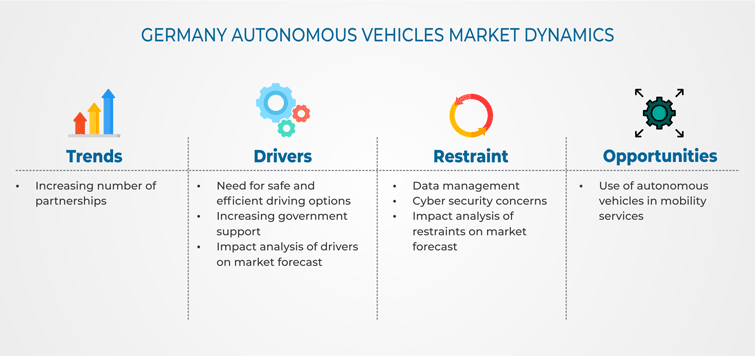Report Code: 11683 | Available Format: PDF | Pages: 151
Germany Autonomous Vehicle Market Research Report: By Vehicle Autonomy (Semi-Autonomous Vehicle, Fully Autonomous Vehicle), Vehicle Type (Internal Combustion Engine, Hybrid Electric Vehicle, Battery Electric Vehicle), Application (Personal Cars, Ride Hailing Services, Transit Buses, Motor Coaches, Logistics) - Competition Analysis and Growth Forecast to 2030
- Report Code: 11683
- Available Format: PDF
- Pages: 151
- Report Description
- Table of Contents
- Market Segmentation
- Request Free Sample
Germany Autonomous Vehicles Market Overview
The German fully autonomous vehicles market is expected to be valued at $28.0 billion in 2030, and is further expected to grow at a CAGR of 20.2% during the period 2023–2030. The need for a safer and more efficient driving option and increasing government support toward the adoption of autonomous vehicles are the major factors driving the growth of the German autonomous vehicles market.

On the basis of vehicle autonomy, the German autonomous vehicles market has been categorized into semi-autonomous vehicles and fully autonomous vehicles. Between the two, the semi-autonomous vehicles held 100% market share in 2018. However, after the introduction of the fully autonomous vehicles, which are expected to be marketed from 2023, this category is expected to witness the fastest growth, during the period 2023–2030. This is mainly due to the rising adoption of levels 4 and 5 autonomous vehicles for personal and sharing service usages.
Based on vehicle type, the German autonomous vehicles market has been categorized into ICE, HEV, and BEV. During the forecast period, the market is expected to witness the fastest growth in the category of BEV. The growing demand for innovative and sophisticated technologies in the country coupled with less technological barriers for electric vehicle is expected to boost the market in the country. Additionally, increasing government support, in the form of incentives and grants, for the adoption of battery electric vehicles and stringent emission regulations are fueling the growth of the market in the country.
On the basis of application, the German autonomous vehicles market has been categorized into personal cars, ride hailing, transit buses, motor coaches, logistics, and others. Among these, the personal cars category will continue dominating the market during the forecast period, closely followed by logistics category. However, motor coaches category is expected to witness the fastest growth during the forecast period. The growing availability of shared autonomous vehicles in the country and changing consumer perspective toward car ownership scenario is leading the German population to switch toward public transportation, thus boosting the market for motor coaches.
Germany Autonomous Vehicles Market Dynamics

Drivers
Germany is the first country in the world to authorize semi and fully autonomous driving systems. In December 2016, the government publicized its objectives to develop autonomous driving infrastructure in the country. Consequently, an amendment was made to the German Road Traffic Act in June 2017, enabling a driver to pass off driving control to an autonomous vehicle. Today, semi-autonomous vehicle (level 1 to level 3) are on roads in which acceleration/deacceleration and steering can be controlled by the vehicle itself, but the driver has to be on board and stay alert so that he/she is be able to control the functions in an emergency.
Currently, major OEMs and technology providers are working on level 4 and level 5 autonomous vehicles and they have got the authorization to test driverless vehicles on public roads. Some cities have even given permission to operate pilot fleets to test the technology in isolated areas by recreating regular traffic on public roads in those isolated areas. For instance, in March 2018, Berliner Verkehrsbetriebe (BVG) and Charité – Universitätsmedizin Berlin in collaboration with EasyMile SAS and Navya SAS launched a pilot project to test autonomous shuttle on the campus of the Charité in Berlin. Thus, the increasing government support is propelling the growth of the German autonomous vehicles market.
Restraints
Equipped with hundreds of sensors on board, an autonomous vehicle is capable of producing terabytes of data each day, and the increasing number of autonomous vehicles will contribute to the generation of data in bulk every day. Autonomous vehicles can upload around 25 GB of data to the cloud on per-hour basis, and with the growing number of these vehicle facilities, the data uploading will also continue increasing. Also, as the computer-assisted designed shifted from 2D models to 3D models, unstructured file data increased substantially. This, in turn, rises the data management issues. Such factor would hinder the growth of the German autonomous vehicles market.
In the coming years, automotive designs may also revolutionize by virtual reality, further contributing to the data generation amount during the design processes. In addition, OEMs are in process of developing and deploying software crash simulations to amplify safety testing of the vehicles. As these systems become more comprehensive and detailed, and will also be responsible to generate larger amount of data, which a major concern regarding their management. This is likely to restrain the growth of the German autonomous vehicles market.
Germany Autonomous Vehicles Market Competitive Landscape
.png)
The German autonomous vehicles market was consolidated with top five players in 2018. In the same year, in passenger car category, Volkswagen AG was the market leader; whereas, in the commercial vehicle category, FCA Italy S.p.A was one of the major players. The other major players dominating the market are Groupe PSA, BMW Group, Hyndai Motor Co., Toyota Motor Co., Tesla Inc., Renault-Nissan B.V., Ford motor Co., and Daimler AG..
Want a report tailored exactly to your business strategy?
Request CustomizationWant an insight-rich discussion with the report author?
Speak to AnalystOur dedication to providing the most-accurate market information has earned us verification by Dun & Bradstreet (D&B). We strive for quality checking of the highest level to enable data-driven decision making for you
Our insights into the minutest levels of the markets, including the latest trends and competitive landscape, give you all the answers you need to take your business to new heights
With 24/7 research support, we ensure that the wheels of your business never stop turning. Don’t let time stand in your way. Get all your queries answered with a simple phone call or email, as and when required
We take a cautious approach to protecting your personal and confidential information. Trust is the strongest bond that connects us and our clients, and trust we build by complying with all international and domestic data protection and privacy laws